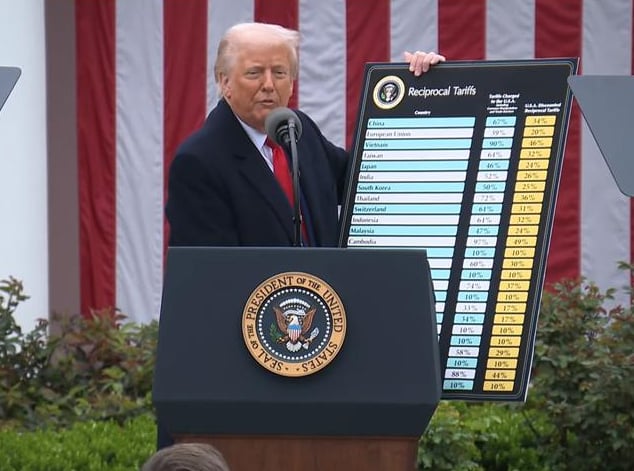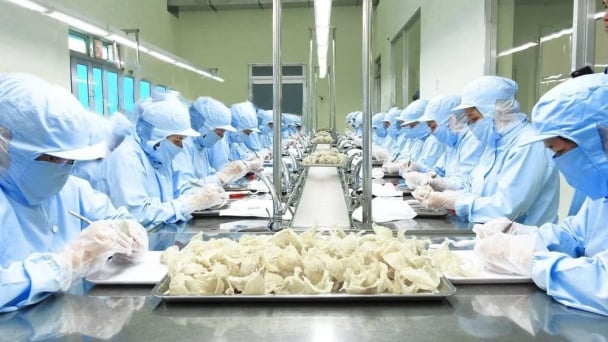May 16, 2025 | 09:51 GMT +7
May 16, 2025 | 09:51 GMT +7
Hotline: 0913.378.918
May 16, 2025 | 09:51 GMT +7
Hotline: 0913.378.918

President Donald Trump holds up a list of countries, their average tariffs and a new line of reciprocal tariffs he announced for trading partners. Trump said he would protect farmers and open up new markets for agricultural products, but his main goal is to stimulate domestic manufacturing jobs.
With countries like China (34%), Vietnam (46%), and Thailand (36%) facing steeper duties, India holds a relative tariff advantage, especially in seafood and rice exports.
India could maintain or even expand its agricultural exports to the United States despite newly announced tariffs, as competing nations face even steeper duties, agricultural economist Ashok Gulati said on Thursday. US President Donald Trump has announced reciprocal tariffs on countries across the board, declaring a 26 per cent "discounted reciprocal tariff" on India.
Trump's 26 per cent tariff on Indian goods would have a limited impact on key agricultural exports like seafood and rice when compared to higher duties imposed on regional competitors, Gulati said."We should not look at the tariff increase in absolute terms, but see relative tariff increases with our competitors," Gulati told PTI.
The former chairman of the Commission for Agricultural Costs and Prices (CACP) noted that while India faces 26 per cent tariffs, China faces 34 per cent, creating an 8 per cent differential advantage for Indian exporters.Other competitors face even steeper barriers, with Vietnam at 46 per cent, Bangladesh at 37 per cent, Thailand at 36 per cent, and Indonesia at 32 per cent, Gulati said.
For seafood exports, particularly shrimp, Gulati explained that India's relative tariff advantage combined with shrimp's small share in overall US food expenditure means demand is unlikely to shrink significantly.
Similarly for rice exports, where current US tariffs range between 9 and 11 per cent, India maintains a competitive edge against Vietnam and Thailand despite the increase to 26 per cent.Gulati, currently chair professor for agriculture at the Indian Council for Research on International Economic Relations (ICRIER), suggested India could potentially gain market share in spaces vacated by higher-taxed competitors.
economictimes

(VAN) Japan's efforts to lower the price of rice through the release of its stockpile may finally be making some progress, albeit at a snail's pace.

(VAN) U.S. tariffs are not only a 'shock', but also an opportunity for Vietnamese businesses to renew their mindset toward comprehensive development.

(VAN) As Bac Giang lychee enters the harvest season, Minister Do Duc Duy expects that the fruit will contribute greatly to agricultural exports due to standardized production and deep processing.

(VAN) Consumers have shown a preference for free-range eggs, but those farming systems are more vulnerable to biosecurity risks like bird flu.
/2025/05/09/5701-1-184335_301.jpg)
(VAN) Vietnam’s eel exports nearly doubled thanks to a mud-free farming model, opening up new prospects while still facing numerous barriers related to international standards.

(VAN) Minister Do Duc Duy warned that if production is not professionalized and supply chains are not transparent, the U.S. market could become a growth bottleneck.

(VAN) Delegating surveillance responsibilities to local authorities is a cost-saving and efficiency-boosting measure that removes a key bottleneck for enterprises, according to Director General Duong Tat Thang.